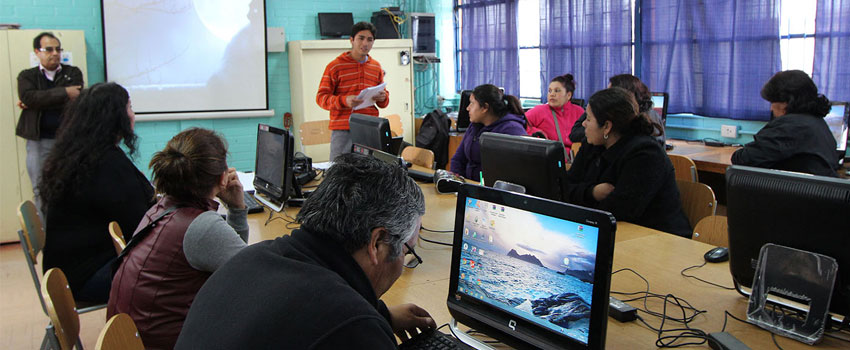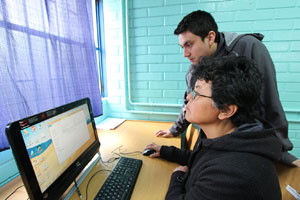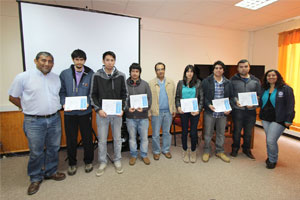- News
Computer Engineering students are trained as technological literacy facilitators with the Intel-CIE course

The young people already had their first experience as facilitators, taking a course for parents and officials of the San Martín de Porres School in Las Compañías.
Happy and proud were the Computer Engineering students from the University of La Serena who received their diplomas from the Facilitators Course, an initiative developed by Intel Learn and executed by the Educational Computing Center (CIE) of the higher education institution.
In this way, the young people who study the subject “Computer Science and Society” of this career of the Faculty of Sciences, were enabled to carry out training in the modules “Technology and Community” and “Technology at Work”, within the framework of the objectives and actions of the Intel Community Digital Inclusion Program Learn Chile.
The delivery of diplomas took place in the Videoconference Room of the Department of Mathematics and was attended by the dean of the Faculty, Dr. Gustavo Labbé, the academic secretary of the Department, Mg. Eduvina Villagrán, the director of the School of Computer Engineering, Miguel Ramos, the person in charge of the program at the CIE, Eva Toro, and the subject's professor, Mg. Raul Gomez.
These young people already had their first experience as facilitators last week, when they started a technological literacy course for parents and officials of the San Martín de Porres School in Las Compañías. The opportunity makes them happy, being able to help people by putting their knowledge into practice.
This activity is part of the joint work agreement between the Faculty of Sciences and the aforementioned establishment, said Miguel Ramos. In this way, the School Director added, the University is closer to the community and, with this particular course, it is possible to help parents, who often do not have a complete understanding of technology, which prevents them from accompanying and guide your children in tasks such as doing their schoolwork.
 “The University calls it connection with the environment. Under my concept, it is responding to what the community has given to the University from the State and how we have to repay our social commitment. (…) We have the responsibility of training the professional, but we also have to be able to train the person and, from that perspective, being able to have a professional with social awareness, with critical thinking (…) is part of our commitment ”Ramos mentioned.
“The University calls it connection with the environment. Under my concept, it is responding to what the community has given to the University from the State and how we have to repay our social commitment. (…) We have the responsibility of training the professional, but we also have to be able to train the person and, from that perspective, being able to have a professional with social awareness, with critical thinking (…) is part of our commitment ”Ramos mentioned.
The ULS CIE develops its digital literacy program as part of its agreement with Intel. Eva Toro explains that the purpose is to take it to places where technological resources are scarce. “Training consists of training students in the Intel Learn methodology, where skills are developed that will help us function in the XNUMXst century. They are Computer Engineering students, so they handle the technology area. They are training as trainers, it is about providing pedagogical tools so that they can face different situations. As they are young, they manage to do this quickly, they understand, we did simulations in classes where they managed to face an audience, which was ourselves, and the difficulties that this has,” she added.
“This methodology develops three skills: critical thinking, collaboration and technological literacy, which does not mean that they know how to use the computer, but that they can extract information from technology and make a new whole. Critical thinking is solving problems through four sequenced steps provided by the PBL (Project Based Learning) methodology, which are: plan it, do it, review it and share it. And collaboration is that it is always better to work between two than to work alone, because better products come out,” explained Toro.
Link with the community
The course that began at the San Martín de Porres School “was a very rewarding experience, because you can see that it is difficult for them. Little by little they become motivated by the topic of learning. We need to dedicate more hours, but we are just starting and I hope we can continue with this,” said Paulina Cáceres, one of the ULS student facilitators.
 For another of the monitors, Erick Castillo, who is also the president of the Career's Student Center, the valuable thing about the opportunity is that “our career is focused on working in multidisciplinary teams, but in the part of solving problems. In this case, it was like a project that was established in the subject of “Computer Science and Society”, taught by Professor Raúl Gómez, in which a stronger link was established between the University and the community. The parents were very happy with the training, sessions will continue to be held.”
For another of the monitors, Erick Castillo, who is also the president of the Career's Student Center, the valuable thing about the opportunity is that “our career is focused on working in multidisciplinary teams, but in the part of solving problems. In this case, it was like a project that was established in the subject of “Computer Science and Society”, taught by Professor Raúl Gómez, in which a stronger link was established between the University and the community. The parents were very happy with the training, sessions will continue to be held.”
And the work has also motivated other students in the program. Castillo comments that “there were some colleagues who told me that as much as possible it would be in all generations that they go through the career, due to the fact that it is a skill that also serves us in the professional field and, on the other hand, that "It establishes a more social instinct for us as students and professionals."
